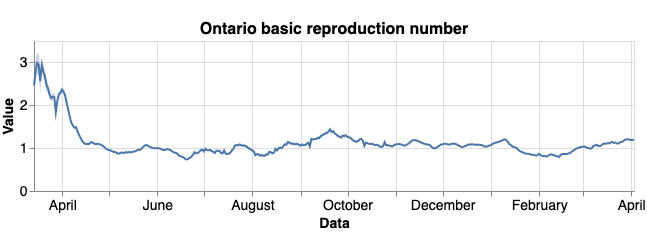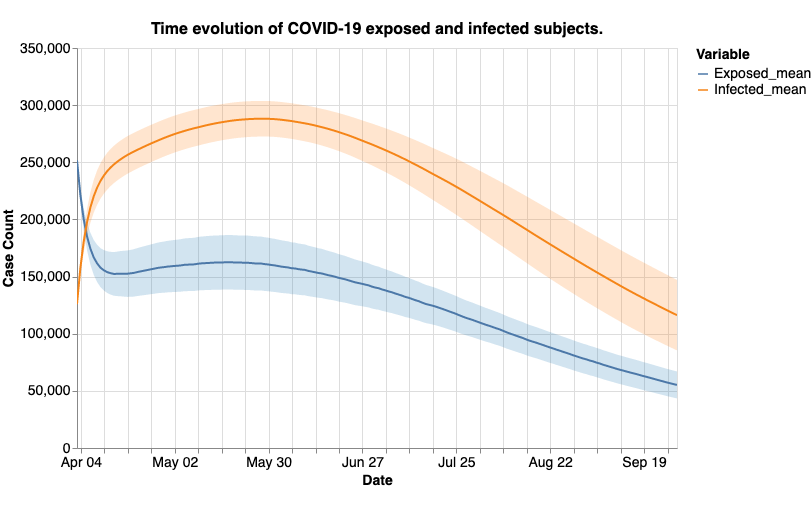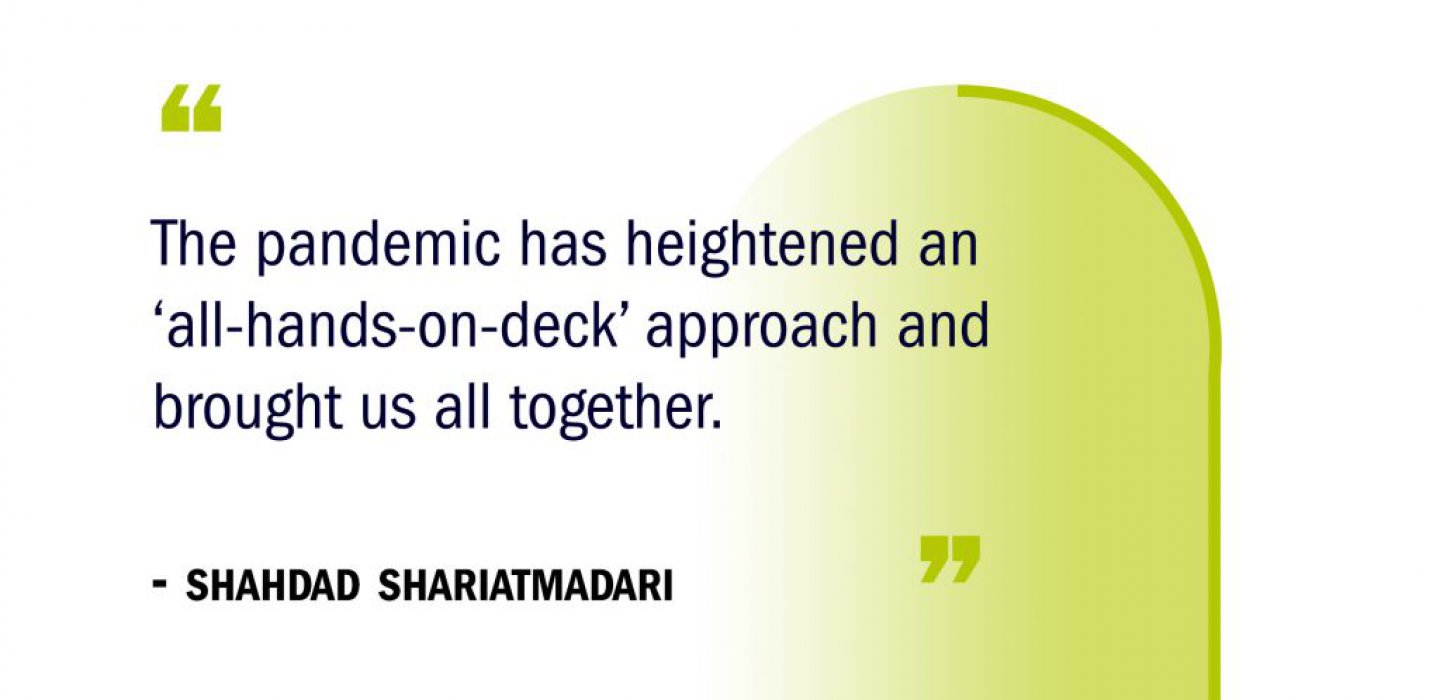Researchers at Humber College are working closely with industry partner Intransigense Corporation to develop a simulator capable of predicting the resources a hospital would require to deal with anticipated and existing COVID-19 cases.
One of the main concerns of the pandemic is the continued stress on public healthcare systems. Given the high hospitalization rates, occupancy rates of wards and intensive care units (ICUs) continue to rise. Due to the virus’s contagious nature, a unit must undergo a lengthy cleaning process once it has been used for a COVID-19 positive patient. Therefore, it is common to reserve a certain number of units for COVID-19 treatment while using the remaining to treat other illnesses. Suppose hospitals could predict the number of positive cases arising during a certain time period. In that case, they can optimize the number of resources and staff needed during the outbreak improving efficiency and ultimately reducing stress on the public health system.

Staying ahead of the game
Intransigense implements real-time analytics engines to help organizations make better business decisions and have a competitive edge, specializing in AI-powered visualization tools and data analytics. Their focus is to proactively engage with customers, stating that simply providing a product and service is not enough in today’s competitive world.
With the recent spread of the COVID-19 virus, Intransigense realized the potential of simulation, which could directly improve hospital responses to the COVID-19 crisis. Intransigense has taken pioneering steps at the beginning of the COVID-19 pandemic to model its spread. Working with consulting epidemiologists, developers, mathematicians, engineers, and medical doctors, as well as performing detailed ongoing literature review, the company has come up with a preliminary novel methodology for predicting cases of the COVID-19 illness based on a set of parameters.
Prime objective
Intransigense has partnered with Humber College. The objective of the project is to create a hospital resource prediction software or simulator that can be used by health authorities at the municipal level to predict the resources and forecast the demand for ward and ICU beds. All necessary data is available publicly through official government-issued reports and databases. The simulator makes use of several parameters which are adjustable by hospital staff in making these predictions. Using the data from the simulator, hospital administrators can manage staffing needs (nurses, physicians) and equipment requirements (masks, ventilators, ICU beds, etc.) on a daily, weekly or monthly basis.
Local health authorities must be equipped with the necessary simulation tools to predict this demand properly, as both over and under-estimation of needed units are an issue. It is vital that forecasts take into account municipal-level data, which include (but are not limited to):
1. Number of positive cases
2. Tests realized
3. Health system capacity in ward and ICU beds
4. Age pyramid
5. As well as the epidemiological factors of COVID- 19 such as the basic reproduction number, incubation and infectious periods.

Humber Research & Innovation successfully earned the grant – NSERC Applied Research Rapid Response to COVID-19
The project aligns with both themes of the NSERC Rapid Response to COVID-19 fund: assisting industry with a production challenge and providing a health solution to the community. This grant will enable Intransigense to research further resulting in an optimal solution. Intransigense sees Humber as an innovative partner that can help build on the expectational model. The expected project steps would be:
1. Mathematical Modelling: Feed the aggregated data into an epidemiological model for forecasting;
2. Visualization: Create a user-friendly web front-end to present results to hospital administrators
3. Test and fine-tune web interface for launch
4. Additional graphs, modules for registered users
5. Improve mathematical models based on literature, test and deploy on a live system
6. Add additional external data sources, including live tweets, news articles, etc. as parameters to model
7. Final testing of system modules, accuracy testing based on actual ICU/equipment usage etc.
Team leads, teamwork and collaboration within the COVID-19 context
The Humber leads are Shahdad Shariatmadari, M.Eng., Professor and Program Coordinator, Faculty of Applied Science and Technology as the Principal Investigator (PI). Shahdad has over 10 years of experience in the IT industry as a software developer, web developer and database administrator. Shahdad will guide Research Assistants and work with the industry partner to accomplish the project plan’s milestones; student researchers will be responsible for data engineering and will focus on the front-end web user interface; they are responsible for creating charts, widgets and other dashboards on the web interface. The current software has been designed for a generic hospital, and the Canadian system will require changes to be made under the direction of the company’s experts.
“The pandemic has heightened an ‘all-hands-on-deck’ approach and brought us all together. It is an honour to work with a fantastic industry partner like Intransigense Corp. and their team, and to engage our grads/students in this project. So proud of the outcomes so far, and more to be achieved.” – Shahdad Shariatmadari
Intransigense Corp.’s leads are Saber Amini, Ph. D., co-founder, specializing in sensor readout circuits; Huen Oh, senior software developer and Vito Ribeiro, a preventive medicine and health management resident physician and consultant. Mr. Oh will be working with Humber team members in the implementation of the system.
Humber College will have a dedicated project team, PI and five Student Researchers from the Information Technology Solutions and Enterprise Software Development programs. This project team will work remotely with bi-weekly meetings to review the work done and tackle any challenges. Faculty and industry partners will provide technical guidance to the students.
Humber Research & Innovation will be responsible for the management and administration of the overall initiative, including operational and financial management, partnership development, and knowledge and technology transfer activities.
Potential for Impact
“For tackling challenges like the pandemic, we need a growth mindset,” says Dr. Ginger Grant, Ph.D., Dean of Humber Research & Innovation. “We need to tap our potential for taking ideas all the way to where they have an impact.”
A close monitoring of resources is imperative. We anticipate a greater need for hospitals to monitor their resources as and when the COVID-19 restrictions are relaxed, and workplaces and the economy open. This simulator tool can help hospitals make informed decisions and prepare for capacity strain, aiding clinical operations and the staff to identify when hospital resources would be saturated. Hospital leaders are continuously challenged during the COVID-19 pandemic to make time-sensitive and critical decisions about resource allocations.
The success of projects such as these is an outcome we are enthusiastic about sharing with our audience. Expect an update from us in the coming months.
You can follow the epidemiological model on the project website: http://covid19simulator.ca/.
.
In the meantime, we want to hear from you. What are some of the projects you are leading? What’s in the pipeline for your organization? Comment on our LinkedIn Page
